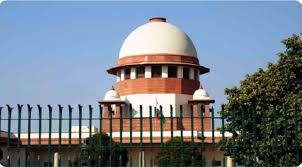It was agreed that two dispute heads (claim 2(b) to 2(d)) and the Chennai Metro’s counter claim would be referred to a three-member tribunal under the Arbitration and Conciliation Act, 1996 (hereafter “the Act”). The tribunal was then constituted. (Para 1)
The award passed in those proceedings became the subject matter of challenge (by Afcons) under Section 34 which was declined by an order of the Madras High Court. The appeal against that order was thereafter pending. (Para 2)
The tribunal in the present case on 13.04.2022 decided that suspension of its proceedings due to the pendency of the appeal, to await the outcome of the Division Bench was not in the larger interest of justice and proceeded with other part of the claim which was pending before it. (Para 3)
Initially, the High Court granted an interim order, staying the proceedings. [By interim order dated 25.08.2022 in A. No 3566/2022.] However, after hearing counsel for the parties, and considering the materials on the record, the court dismissed the application, filed by Chennai Metro through the impugned judgment. (Para 5)
that the unilateral increase of fee by the tribunal despite the protests or objections of one of the disputing parties, is impermissible in law, which renders the tribunal being exposed to the charge that justifiable grounds about their continuing to be impartial, arises. (Para 6)
It was submitted that Chennai Metro is justified in arguing that the apprehension that the proceedings or the outcome would not be conducted and finalized with an impartial mind. (Para 8)
It was submitted that the tribunal also withheld and suppressed the fact that the members had received payment of the revised fee from Afcons on 25.07.2022. This is one more aspect which ought to have been duly noted by the High Court. (Para 9)
This conduct and the persistence of the members of the tribunal to insist that the higher fee should be paid – and for the past period too, would lead any reasonable man to conclude that there was bias or real likelihood of bias and that the tribunal would not conduct its proceedings in an impartial manner.
At this stage it would be crucial to notice that the court made a differentiation. It stated, firstly, that a disclosure in writing about circumstances likely to give justifiable doubts is to be made, at the stage of appointment, and then stated that the disclosure can be challenged under Sections 12(1) to 12(4) read with Section 13. The court however underlined that in the next category where the person became ineligible to be appointed as arbitrator, there was no need for a challenge to be laid before the arbitrator. In such circumstances outlined in Section 12(5), the party aggrieved could directly approach the court under Section 14(1)(a). It was further underlined that in all cases under Section 12(5), there is no challenge procedure to be availed of and that if the arbitrator continues at such, the ground of being unable to perform his function since he falls in any of the categories enumerated in the Seventh Schedule, the party concern may apply to the court. (Para 28)
It is, therefore, evident that the rules for disqualification or ineligibility are fairly clear. The ineligibility which attaches to the appointment is the first category: it is contained in Section 12(1) read with the explanation and the Fifth Schedule to the Act. As recounted earlier this schedule has 34 items. In the event any of these circumstances exist, the appointment of the arbitrator is barred. The second category is where the arbitrator to start with is eligible but after appointment incurs any, or becomes subject, to any of the conditions, as enumerated in the Fifth Schedule. In that event, it is open to the party to claim that there could be justifiable doubts about his independence or impartiality. The remedy even then, would be that the party has to seek recourse and apply to the arbitrator in the first stance by virtue of Section 13(2). The wording of Section 13(2) clarifies that a party who intends to challenge the arbitrator, after becoming aware of certain circumstances which lead to justifiable doubts, that party has to within 15 days [of becoming aware] approach the tribunal and seek a ruling. In the event the party is not successful under Section 13(4), the tribunal is duty bound to continue with the proceedings. When the award is made, it can be subjected to challenge under Section 34, by operation of Section 13(5). Clearly, then the substantive grounds and the procedure applicable in relation to situations where justifiable reasons exist or arise, for questioning the eligibility of a tribunal to decide the reference are enumerated in Sections 12 and 13. (Para 29)
That fee increase can be resorted to only with the agreement of parties; in the event of disagreement by one party, the tribunal has to continue with the previous arrangement, or decline to act as arbitrator. Yet, whether the breach of that rule, as in the present case, by insisting that the increase of fee should prevail does not in this court’s opinion, amount to a per se ineligibility, reaching to the level of voiding the tribunal’s appointment, and terminating its mandate. (Para 34)
For the foregoing reasons, this court holds that Chennai Metro’s application cannot succeed. The Arbitrators are directed to resume the proceedings and decide the case in accordance with law. (Para 40)
SUPREME COURT OF INDIA
2023 STPL(Web) 370 SC
[2023 INSC 932]
Chennai Metro Rail Limited Administrative Building Vs. M/S Transtonnelstroy Afcons (Jv) & Anr.
Civil Appellate Jurisdiction Miscellaneous Application No(S). 184 of 2023 in Special Leave Petition (Civil) No(S). 8553 of 2022 With Civil Appeal No(S). 4591 of 2023-Decided on 19-10-2023
https://stpllaw.in/wp-content/uploads/2023/10/2023-STPLWeb-370-SC.pdf







